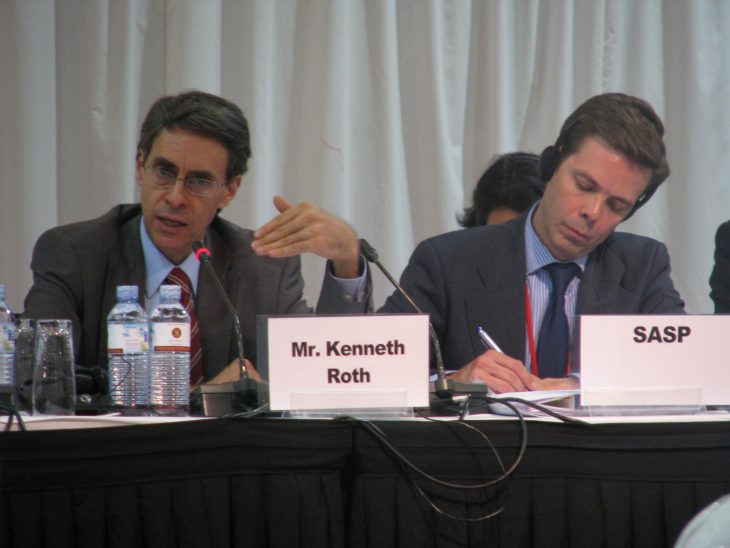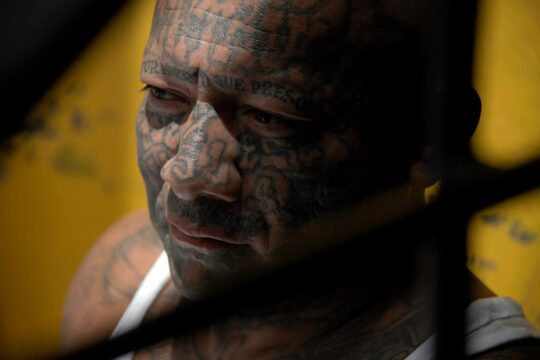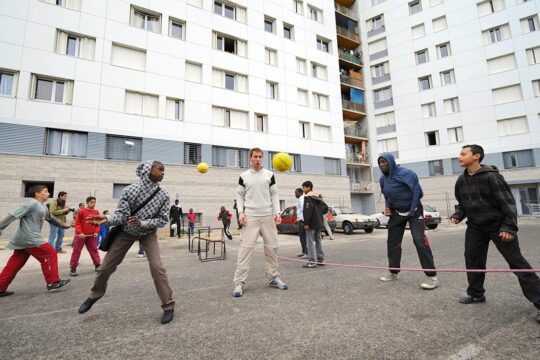On July 17, the International Criminal Court (ICC) celebrates the 20th anniversary of its founding document, the Rome treaty. Interview with Kenneth Roth, executive director of Human Rights Watch (HRW).
Justice Info: What is the significance of this 20th anniversary?
Kenneth Roth: I think the creation of the ICC twenty years ago was an historic moment, because it signals theoretical commitment by the international community to attack the impunity that so often stood behind mass atrocities. So many abusive governments had figured out that if they kill or compromise their domestic judges, they can proceed with their murderous plan, without any worry about criminal prosecution. And the Rome Statute signals, at least in principle, that there would be an untouchable institution. Obviously, it is still a young institution and there is still work in progress. It still has much to do to reach its potential, but that theoretical commitment remains an extremely important one. This is the first global institution. We had Nuremberg, we had the Yugoslav and Rwanda tribunals, but those were all country specific. The ICC opened up the possibility of global justice. That is new. It has been a work in progress, first of all because it does not have a global reach due to a combination of lack of ratifications [123 States have ratified the treaty so far, Burundi withdrew from the Court in October 2016] and the improper use of the veto power at the United Nations Security Council.
You said that the ICC has not yet reached its potential. How do you explain its mistakes?
I think that the first prosecutor, Luis Moreno Ocampo, was more interested in the public relations side of the prosecutorial job than doing the difficult factual work needed to build strong cases. I think he saw himself as establishing the credibility of the institution by fighting public relations battles. At that time, the ICC was attacked by the US and by others and I think he felt that his foremost responsibility was to defend the institution. The problem is that you cannot conduct an investigation by press release. I think some of the early mistakes of the Court are due to inadequate attention to investigative work by Moreno Ocampo. Fatou Bensouda has been much more professional in her approach, much more interested in the difficult work of building cases. But she was stuck with the legacy and she continues to have been constrained by the number of political factors that have worked against her. I will begin with the fact that the state parties to the Court, its strongest supporters, have not helped to arrest suspects, and they have harmed the Court by insisting on zero budgetary growth, while there is an urgent need to increase its capacity to conduct investigations in a number of new places which are crying out for attention.
Don’t you think that so far, the results do not militate in favour of a budgetary increase?
The biggest impediment to having more trials under way has been the failure of the Court members to help arrest suspects. The fact that Bashir [Omar al-Bashir, president of Sudan] can parade around the world, including in ICC member states, and not get arrested and sent to The Hague is a big part of the problem. There would be fewer complaints about the lack of activity if Bashir were sitting in The Hague. But we had him visit South Africa, Jordan, and so on, countries that had a responsibility to arrest him and they did not.
Does it mean the ICC cannot fulfil its mandate?
What it shows is that the ICC, by design, is dependent on its member states to exercise police powers. The Rome treaty could have given the ICC a police force to make arrests. It did not. Instead, delegates in Rome said the member states will take care of that. The strategy the ICC needs is to build governmental support, which they are clearly trying to do. But you will see that governments are of two minds about international prosecution. Governments tend to like international prosecutions when they are for other people suspected of war crimes but not when they are for their own. Kenya tried unsuccessfully to organize a mass withdrawal from the Court when its own leaders were being prosecuted. The US can predictably go on the offensive if there is a prosecution in Afghanistan or in Israel.
What is the place of the ICC today?
It is a central institution, but the architecture is still imperfect. If we take Syria, where there is probably today the largest scale of war crimes, it is an obvious case for the ICC, but it cannot get there because Russia keeps vetoing before the UN Security Council. We have seen that there is a need to circumvent the Russia veto. This happened about a year ago, when the General Assembly created the 3IM [International, Impartial and Independent Mechanism], in essence the Special Syria Prosecutor. As the 3IM has enough evidence to go forward, I hope there will be a new effort to build up a tribunal through the General Assembly, where there is no veto. That would be a way to supplement the ICC. I wish the ICC were central to Syria, but Russia has prevented that.
On this point, the biggest remaining issue is Idlib, where 2.3 million people are at risk of being slaughtered by Russian and Syrian attacks. Idlib is where everybody is dumped when other enclaves fall. And if Syria and Russia continue what they had been doing, which is firing indiscriminately in civilian areas to target hospitals and schools and other civilian institutions, there are many people whose lives will be lost. If suddenly the ICC had jurisdiction, if Putin and Assad recognize they cannot continue their war crimes strategy with impunity, it might save many lives.





